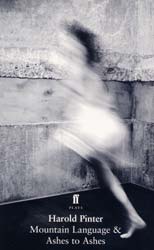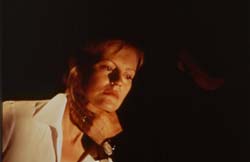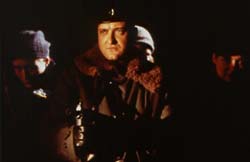
|
||
|
Mountain Language & Ashes To Ashes 2001
|
|||
Directed by Katie Mitchell Mountain Language Ashes to Ashes |
|||
The Evening Standard - Wed. 27th
June 2001 Katie Mitchell's production starts with an adrenaline surge, as darkness falls suddenly on the auditorium like an ambush, and audience members' ears are invaded with the hostile sounds of dogs barking and helicopters whirring. IT feels as if each individual has been shoved rudely from the world of civilisation encapsulated in the Royal Court auditorium, and into the world of obscene and cruelly whimsical power games that we so comfortably associate with other political regimes. Mountain Language was first performed in 1988, and Ashes to Ashes in 1996, but the two fit together as neatly as consecutive clauses in Pinter's tightly constructed argument on aggression that goes back to plays like The Caretaker. By placing the darkly comedic Mountain Language before Ashes to Ashes, Mitchell robs the latter of its much-criticised obliqueness, so that instead of viewing this second play as a domestic drama that escalates from the personal to the overtly political, through visual echoes, the warscape is there from the start. Pinter has often been attacked for focusing his lens more closely on politics in his later works, but Mitchell's beautifully controlled aesthetic and imaginative use of sound reveals two plays where the language games and the scalpel-sharp dissection of human relationships carry an intriguing universality. In the first, seemingly more simple piece, soldiers play power games with a group of mountain inhabitants who have been waiting in the snow for eight hours. In the second, a woman gives her husband a fragmentary account of her involvement, through her love, in wartime atrocities. Ironically, the power of Mountain Language manifests itself less in words than in its pictures, because Mitchell has turned it into starkly painted tableaux of terror. An old woman with a bandaged hand freezes in dismay and a soldier - in a gesture reminiscent of Prussian soldiers in Guy de Maupasant's Contes de Guerre - eats the apples she has brought for the man they have tortured. Paul Constable's lighting design, by suddenly highlighting expressions and creating shifting shadows, reveals the layers of terror in each situation, while the stage curtain narrows into telling close-ups. In Ashes to Ashes, Anastasia Hille's gently intelligent performance demonstrates Pinter's psychological acuity about the impact of aggression. Her elusive, fragmented description of her love evokes the mental dislocation of trauma at the same time as revealing the defused aggression inherent in all acts of human intimacy. Each word is linguistic dynamite. At 70, it shows that Pinter's power is not diminishing. Rachel Halliburton
The Financial Times - Friday 29th
June 2001 Expansive roles on an intimate scale. Harold Pinter was 70 last October. There were celebrations; and witty things were said about the famous adjective "Pinteresque", whose meanings include "suspenseful", "erotic", "menacing", etc . . . Pinter himself drily remarked that he sometimes did indeed feel suspenseful, erotic, menacing, etc . . . But is enough thought given to the Pinter of today? His best known plays are still the classics of 1958-65: above all, The Birthday Party, The Caretaker, The Lover and The Homecoming. However, those are the easier Pinter plays; and for all their extraordinary achievement as drama, they show the "Pinteresque" qualities in early stages of evolution. "Later Pinter" started in 1968, and the post 1968 plays are all the more Pinteresque. Pinter himself is a man of considerable masculine force, and yet he is among the few modern male artists in whose work we really can feel a female muse at work. The plays I love best are those in which he gives the most large-spirited, imaginative, poetic, roles to women. When he writes an expansive role for the muse in his plays, the antithesis of masculine and feminine principles makes for unique drama. My favourite play is the 1968 Landscape, in which he first and most lyrically defined this genre. But a later example of Pinter's muse is his 1997 Ashes to Ashes, now on at the Royal Court. Ashes to Ashes - the play that contains both his most astonishing female role and his most difficult male role - is the most completely "Pinteresque" play he has ever written. It's easy to see how it sprang out of Landscape. Like that, Ashes to Ashes is a single-scene dialogue for one man, and one woman, who never shifts from her seat. But Beth in Landscape, speaks only of her lyrical memories, whereas Rebecca in Ashes to Ashes is far more complex. Rebecca is haunted by appalling memories: genocide, deportation, and most disturbingly, a tenderly recalled masochistic-erotic relationship with a modern Herod-like infanticide. In fact, Rebecca may never have experienced these things. And Devlin, the lover/therapist/bully who elicits her memories and then brushes them aside, is a partly desperate figure as he tries to pin her down to historical face and psychological truth. But, whether or not Rebecca's memories are false, they are true to some of the most appalling events of the 20th century, and so she becomes the larger and truer spirit, while Devlin becomes not only repressive of her but also repressed in himself. Pinter's suspenseful/erotic/menacing virtues are here (in spades), but so are his concern for political oppression, his romantic fascination with the inspired female, and his brilliantly felt-from-within sympathy for psychological abnormality. No play of our time more profoundly marries the personal and the political. So it was clever of the director Katie Mitchell to revive this five-year-old play in a double bill with Pinter's 1988 Mountain Language, which shows scenes of savage political oppression not unlike those "recalled" by Rebecca. It is, however, a mistake to run the two plays together without any break; and a mistake to cast Anastasia Hille and Neil Dudgeon in both plays, encouraging viewers to see Devlin as someone denying his own Mountain Language pas and Rebecca genuinely recovering from hers. Though the connections between the plays are interesting, both shrink and lose many of their ambiguities when they are played together. Neil Dudgeon's coarse performance as Devlin does not help matters. This exceptionally hard role works best when, for all his narrowness, we feel - if only at times - his tender concern for
Rebecca's psychological welfare and his sensitivity. The play's tragedy lies in his baffled inability to follow her imaginative involvement with scenes of horror. Another mistake lies in the small-scale performing style in which Mitchell has asked her actors to speak, and the fidgety realism with which she has encouraged them to fill Pinter's famous pauses. Pinter, like Beckett, should be played like music. Play the phrases, the punctuation, the sonorities, play them with controlled theatrical projection and without extraneous socio-psychological explanations, and the meanings will take care of themselves: this sounds a dangerous theatrical method, but many a Pinter director has shown its dramatic power. Not so here. The Royal Court production - which will go to New York next month for Pinter Festival - feels meagre. As Rebecca, Anastasia Hille gives one of her finest performances, with some extremely subtle perceptions. But her style is nervous, pinched, prosaic. The winged, elusive, uncapturable dark poetry of Rebecca's confused soul - probably Pinter's most extraordinary single achievement as a dramatist - is absent here. A pint-sized production: the opposite of Pinteresque. Alastair Macaulay |
|||
| Back to plays Main Page |




